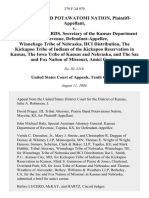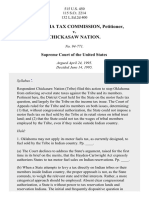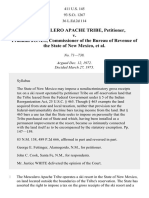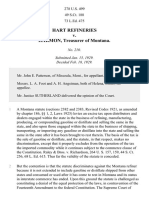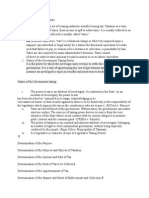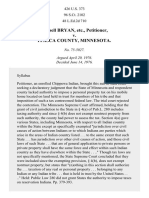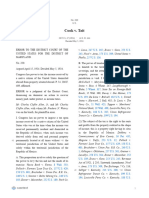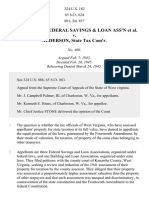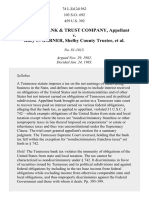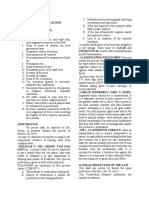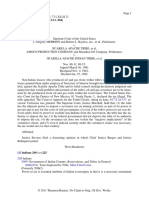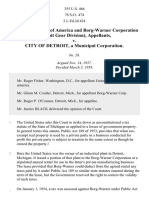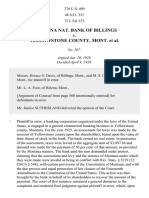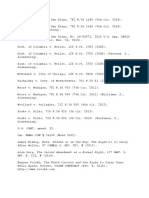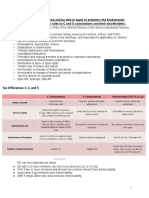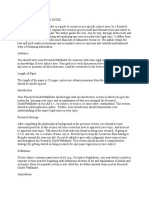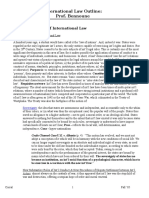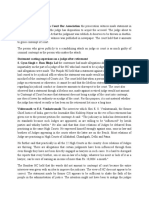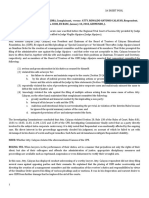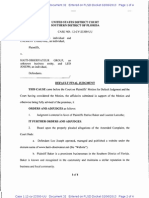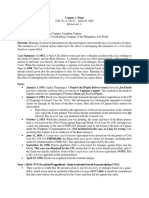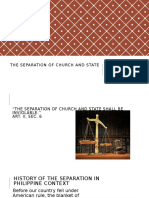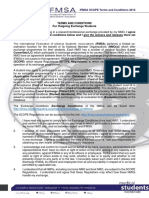Rejecting Balancing Tests and Limiting Indian Tax Immunity
INTRODUCTION: In Wagnon v. Prairie Band Potawatomi Nation,
the Supreme Court considered the validity of a Kansas motor fuel
tax imposed on a non-Indian distributor providing fuel to an
Indian owned and operated reservation gas station. Asserting
that this application of the fuel tax was an “impermissible
affront to its sovereignty,” the Prairie Band Potawatomi Nation
(“Nation”) filed suit in federal district court to enjoin Kansas
from levying the tax on fuel sold to the Nation. However, the
district court granted summary judgment in favor of the state.
On appeal, the Tenth Circuit reversed and invalidated
Kansas’ tax as applied to fuel distributed to the Nation. After
balancing state, tribal, and federal interests, the court
reasoned that “Kansas’ generalized interest in raising revenues
[was] insufficient to justify its tax” in light of the federal
and tribal interests in “promoting tribal economic development,
tribal self-sufficiency, and strong tribal governments.”
However, the Supreme Court ultimately reversed, holding that
Kansas’ tax as applied to the fuel distributors is valid and does
not infringe upon the Nation’s sovereignty. Furthermore, the
Court determined that the interest-balancing test relied on by
the lower courts is inapplicable when the challenged tax is
directed at the off-reservation activities of non-Indians.
BACKGROUND: The U.S. Constitution specifically grants
1
�Congress the power to regulate commerce with Indian tribes.
Thus, Congress’ specific grant of power, together with the
inherent sovereignty of Indian tribes, creates distinct barriers
of federal preemption to states attempting to exercise regulatory
functions over Indian reservations and tribal members. Modern
jurisprudence addressing the tension between Indian sovereignty
and states’ regulatory powers can be traced back to Williams v.
Lee. In Williams, the Court held that Arizona could not exercise
jurisdiction over a non-Indian’s claim arising from an on-
reservation business transaction with an Indian. Attempting to
develop a framework for evaluating the scope of state power vis a
vis the Indians, the Court reasoned that allowing jurisdiction
would encroach on the right of Indian self-government. However,
in Mescalero Apache Tribe v. Jones, the Court distinguished off-
reservation tribal activities and held that the tribal operation
of an off-reservation ski resort was subject to New Mexico’s
gross receipts tax.
As the case law evolved, the Court recognized the need for a
more “particularized inquiry into the nature of the state,
federal, and tribal interests at stake . . . to determine
whether, in the specific context, the exercise of state authority
would violate federal law.” Therefore, in Indian tax cases:
[T]he initial and frequently dispositive question . . .
is who bears the legal incidence of [the] tax. If the
legal incidence of an excise tax rests on a tribe or on
2
� tribal members for sales made inside Indian country, the
tax cannot be enforced absent clear congressional
authorization. But if the legal incidence of the tax
rests on non-Indians, no categorical bar prevents
enforcement of the tax; if the balance of federal, state,
and tribal interests favors the State, and federal law is
not to the contrary, the State may impose its levy[.]
The application of this interest-balancing test frequently
results in a judgment against the state when the incidence of a
tax or regulation is directed at on-reservation activities.
Nevertheless, a state’s legitimate interest in a tax directed at
non-Indians may still outweigh tribal interests, even if that tax
indirectly burdens on-reservation activity.
Furthermore, the legal incidence of a tax is not immutable,
and the Court has signaled that state legislatures can amend
existing law to shift the incidence of a tax. The Court has also
implied that such a shift may yield a more permissive result for
the state. In light of this suggestion, Kansas amended its motor
fuel tax, and shifted the legal incidence of the tax to fuel
distributors. However, this modification did not foreclose lower
court applications of the Bracker interest-balancing test in
cases where the legal incidence of the tax fell on the off-
reservation receipt of fuel by distributors.
ANALYSIS: The Court granted certiorari in Wagnon to
determine whether Kansas’ fuel tax on a non-Indian distributor’s
off-reservation receipt of fuel should be subject to the Bracker
interest-balancing test when that fuel is subsequently sold on-
3
�reservation to an Indian fuel station. In an opinion by Justice
Thomas, the Court holds that the Bracker balancing test should
not be applied to the Kansas fuel tax. However, prior to
determining the applicability of the balancing test, the Court
considers the Nation’s assertion that the Kansas tax is imposed
on the distributor’s “on-reservation sale and delivery” of fuel,
and not on the off-reservation receipt of fuel.
While the Court acknowledges that a tax imposed on a non-
Indian seller may be pre-empted “if the transaction giving rise
to the tax liability occurs on the reservation and the imposition
of the tax fails to satisfy the Bracker interest-balancing
test[,]” the Court determines that due to the “dispositive
language” of the statute, the triggering event for the Kansas tax
is the distributor’s receipt of fuel, not the subsequent delivery
of that fuel. Furthermore, the Court determines that
notwithstanding certain tax deductions and refunds available to
the distributor under the statute, the distributor’s tax
liability is determined by the amount of fuel received by the
distributor in a given month, and not on the amount of fuel sold
by the distributor. Therefore, the Court rejects the Nation’s
first claim that the incidence of the tax is directed at the
distributor’s on-reservation sale and delivery of fuel.
The Court then holds that the Bracker interest-balancing
test is inapplicable to the Nation’s case, and refuses to extend
4
�the application of the balancing test to situations where a state
exercises “its taxing authority over non-Indians off the
reservation.” The Court reasons that by limiting the Bracker
interest-balancing test to on-reservation transactions, the Court
is both progressing toward the development of a bright-line
standard in the area of Indian tax immunity jurisprudence, and
reaffirming the importance of “special geographic sovereignty
concerns that give rise to the test[.]” Finally, the Court
rejects the Nation’s claim that the tax is “impermissibly
discriminatory” because tax exemptions are provided to fuel sold
to other sovereigns. In holding that the tax is not
“impermissibly discriminatory,” the court reasons that the Nation
is similarly situated to all Kansas retailers effected by the
tax, and that the Nation benefits from state highway programs
funded by the tax.
In dissent, Justice Ginsburg, joined by Justice Kennedy,
challenges the Court’s refusal to apply the Bracker balancing
test. Proposing a much broader interpretation of the test,
Ginsburg asserts that the Court should query whether the ultimate
economic burden of the tax falls on the Nation, not whether the
activity giving rise to the tax occurs on or off the reservation.
Ginsburg also maintains that “Kansas’ placement of the legal
incidence of the fuel tax is not as clear and certain as the
State suggest and the Court holds.” By focusing on the
5
�application and exemptions of the tax, Ginsburg proposes that the
Kansas legislature has not truly shifted the burden of the tax
from the Indian retailer to the distributor.
Moreover, Ginsburg contends that even if the legislature had
shifted the entire tax burden to the distributor, the Court’s
decision in Chickasaw mandates that such a shift “trigger-not
foreclose-interest balancing.” Furthermore, Ginsburg argues that
the majority’s purported “bright-line” standard will only provide
states with greater power to burden on-reservation activities and
will dilute the principles of tribal sovereignty and self-
government. Finally, after applying the Bracker balancing test
to the Kansas tax, Ginsburg determines that invalidating the tax
would lead to a more equitable disbursement of tax revenue for
road maintenance in the State of Kansas.
EVALUATION: The Court’s opinion in Wagnon yields to the
development of manageable standards in an area of law commonly
criticized as inconsistent and unpredictable. Through careful
application of prior precedent, the Court properly restricts the
Bracker interest-balancing test to the review of on-reservation
activity and creates a bright-line rule for lower courts to
follow. Moreover, the Court’s decision to limit the Bracker
test’s applicability will ultimately curtail the flow of
litigation and encourage tribes to seek other avenues of redress.
In light of the dispositive language of the Kansas statute,
6
�and the Court’s prior suggestion in Oklahoma Tax Commission v.
Chickasaw Nation, the Court properly determined that the
incidence of the motor fuel tax was on the distributor and not on
the Nation retailer. While the Nation is arguably effected by
the imposition of the tax, the Court’s determination properly
distinguishes the legal incidence from the indirect burden of a
tax. Furthermore, if the Court had accepted the notion that an
indirect burden should be equated with the incidence of a tax,
the Court would have effectively abrogated the holdings of
Washington v. Confederated Tribes of the Colville Indian
Reservation and Cotton Petroleum Corp. v. New Mexico, which
permit the indirect burden of on-reservation activities.
Moreover, the Court appropriately recognizes that the
Bracker balancing test was developed in an effort to address
special concerns of Indian geographical sovereignty and self-
government. Therefore, the Court reaches a logical conclusion in
determining that the Bracker test should not be extended to
activity occurring outside of the geographical bounds of the
reservation. The Court’s refusal to extend the test is further
consistent with its ruling in Chickasaw, which confirms that
tribal members do not receive the same protections against the
state outside of the reservation.
Furthermore, while Justice Ginsburg may favor ad hoc
litigation, the majority’s bright-line rule limiting the scope of
7
�the Bracker test achieves several important objectives. First,
the Court’s holding provides guidelines for litigants, thus
increasing efficiency and reducing the flow of litigation.
Additionally, the Court’s refusal to extend the Bracker test is
illustrative of the notion that Congress is better suited than
the Court to balance tribal, state, and federal interests. As
one commentator notes, “Congress has never specifically addressed
the problem of state taxation of Indian reservation land and
activities.” Perhaps in light of the Court’s decision, Congress
will take the initiative to enact regulatory measures, such as
federal Indian tax credits, to address the burdens of indirect
state taxation on Indian tribes. Moreover, the Court’s decision
may encourage tribes to take a proactive role in negotiating and
executing tax agreements, or tax compacts, with states to protect
their sovereign interests.
CONCLUSION: Although the outcome of Wagnon may seem unduly
harsh from the perspective of the Nation, the Court’s rejection
of the Bracker interest-balancing test was a necessary
progression toward Indian tax law uniformity. The Court’s
holding is entirely consistent with prior decisions and
reinforces the notions of on-reservation sovereignty and self-
government. Furthermore, while the Court’s decision may
foreclose judicial balancing of off-reservation taxation schemes,
tribal communities burdened by such schemes are not left without
8
�a remedy and may still look to Congress, or alternatively to
states, to effectuate their interests.


